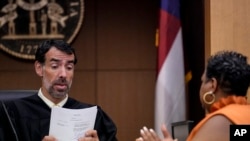In indicting former President Donald Trump and 18 others for racketeering, Fulton County District Attorney Fani Willis has turned to a favorite legal tool she’s employed in high-profile cases: Georgia's Racketeer Influenced and Corrupt Organizations Act, known as RICO.
The 19 defendants face 41 criminal charges in total, ranging from racketeering and making false statements to soliciting a public officer to violate his or her oath. While not every defendant faces the same charge, they all stand accused of violating Georgia’s RICO Act.
The indictment accuses the defendants of conspiring to participate in a “criminal enterprise” to keep Trump in power after he lost the 2020 presidential election to Joe Biden. The bulk of the document — 71 out of 97 pages — is devoted to one racketeering count.
The Georgia law is modeled after a federal statute by the same name that was enacted in 1970 to combat organized crime.
In the 1980s, former Trump lawyer Rudy Giuliani, then serving as the top federal prosecutor for New York City, used RICO to take down New York Mafia bosses. He’s now a RICO defendant in Georgia.
But in recent decades, RICO statutes, both federal and state, have been applied more broadly to target gangs, corrupt politicians and white-collar criminals.
In 2013, Willis, then a top prosecutor in the Fulton County District Attorney’s Office, led a high-profile RICO indictment of dozens of Atlanta teachers and school administrators involved in manipulating student test scores.
Last year, Willis filed a sweeping RICO indictment against prominent Atlanta rapper Young Thug and others allegedly associated with a violent gang. She told the Washington Post that the DA’s office under her watch has brought more RICO cases than in the previous ten years.
Georgia’s RICO statute, enacted in 1980, makes it a crime to engage in a “pattern of racketeering activity” as part of an “enterprise.”
An “enterprise” is not limited to an organization and can extend to individuals participating in criminal schemes.
The “pattern of racketeering activity” part of the statute is defined as criminal conduct arising from two or more criminal violations. More expansive than the federal RICO, the Georgia statute lists more than 40 crimes that qualify.
In the election interference case, that meant Georgia prosecutors had to allege the former president and his associates broke two or more of Georgia’s laws as part of the alleged racketeering conspiracy.
The indictment lists nearly 30 “acts of racketeering activity,” including forgery, false statements and writings, filing false documents and influencing witnesses.
Trump, for example, is accused of false statements and writings for making baseless claims about election fraud during his now-infamous Jan. 2, 2021, call to Georgia Secretary of State Brad Raffensperger.
Giuliani is also charged with false statements and writings for making similarly groundless claims about the 2020 election to a Georgia Senate panel about a month after the vote.
Speaking before the indictment was unveiled, Morgan Cloud, a law professor at Emory University in Georgia, said that the requirement of showing at least two racketeering acts would be “greatly exceeded.”
“Assuming the prosecutors are going to establish and can prove that these things happened, they satisfy the requirements of the law, but the minimum of two racketeering acts will not be a problem under the statute,” Cloud said.
Racketeering charges are unlike ordinary conspiracy charges, which require proof of an explicit agreement among two or more people to commit a crime.
Anthony Michael Kreis, an assistant professor of law at Georgia State University, said that a racketeering charge relies on a broader theory of criminality.
Citing the Georgia test score scandal, he said, “There was no agreement amongst all the people who were involved with the cheating scandal that they were trying to do something unlawful, but they were all advancing a broader criminal goal.”
Trump and his alleged co-conspirators face a number of other counts. But the stakes are high for the RICO charges, because the offense carries stiff penalties.
A defendant could face five to 20 years in prison if convicted of Georgia’s racketeering law, compared with five years for making a false statement.
Racketeering cases offer prosecutors a powerful tool. They can use the threat of lengthy prison terms to get lower-ranking members of a conspiracy to cooperate in exchange for lighter sentences.
But racketeering cases are complex and challenging to build and prosecute.
They require proving a complex web of criminal activities that spanned a period of time and had a common purpose, Cloud said.
Some critics have raised questions about the appropriateness of charging Trump and his allies with racketeering, arguing that it was intended to combat the mob, not election interference.
However, Cloud said that a statute’s application is not limited to its title.
“For example, in the federal statute and in the Georgia Statute, other than the title, there's no reference to racketeers. There's no reference to mobs. There is no reference to gangs,” Cloud said. “The conduct is criminal if defined in terms that include certain acts like making false statements.”




